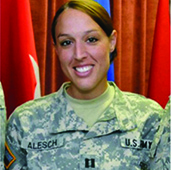BHI’s Resilient Warrior Program Helps Veterans Feel at Home Again
BHI’s Resilient Warrior Program Helps Veterans Feel at Home Again
Home Base helps veterans manage stress and recognize signs of brain injury
BY JENNIFER NEJMAN BOHONAK
- Up to 23 percent had mild traumatic brain injury, commonly known as concussion
- Up to 20 percent had post-traumatic stress disorder
- Up to 37 percent suffered from depression
- Up to 39 percent had problematic alcohol use
- 44 percent of veterans returning home from Iraq and Afghanistan reported they had difficulty returning to civilian life
Source: 2013 Institute of Medicine Report
On most nights, Iraq veteran Molly Alesch uses a journal to relieve stress. She finds a quiet spot and writes down what she is grateful for: A loving family. Flowers in bloom. A good job and access to health care. The practice helps her feel better and sleep better.
Molly, 32, learned how to keep a gratitude journal in a class that teaches veterans to manage stress through meditation, yoga and exercise, as well as how to recognize the signs of brain injury. The class is part of the Resilient Warrior Program, one of the many services of the Red Sox Foundation and Massachusetts General Hospital Home Base Program.
As one of five children growing up in a small town in Iowa, Molly knew the military could help her further her education. She was proud of her older sister who served in the Army National Guard. When the planes struck the twin towers, Molly was a college freshman. The next fall, she joined the Army National Guard. From 2005 to 2006, she served as a logistics officer for an aviation unit in Iraq.
Molly says her tour was easy compared to what some soldiers face. She stayed on the base, which offered some protection. But she was always on-alert. Soldiers were not even allowed to wear headphones when they ran for exercise. They needed to listen for attacks.
When she returned home, Molly carried her war experiences with her. “I think for awhile I had a little bit of survivor guilt,” she says. “You don’t ever get over your tour.”
Helping Post-9/11 Veterans and Families
Home Base is the largest private-sector program in the country devoted to healing the invisible wounds of war—post-traumatic stress, traumatic brain injury, anxiety, depression, military sexual trauma and family relationship challenges. Since its inception in 2009, Home Base has served more than 7,500 post-9/11 veterans and family members and trained more than 10,000 clinicians nationally. Home Base offers wellness programs like the six-session Resilient Warrior program to help veterans feel in control of their lives and manage their stress.
Stress Management Techniques for Veterans
Deployed soldiers develop a sleeping-with-one-eye-open state of mind, says Mass General psychologist Louisa Sylvia, PhD, who along with her colleagues designed the Resilient Warrior course. At home, this response can be problematic. “When a car backfires, you don’t want to reach for your gun,” Dr. Sylvia says. “Or when your son says ‘no,’ you don’t want to feel a swell of anger and aggression.”
Dr. Sylvia teaches veterans to encourage the body’s natural relaxation response. They discuss replacing negative thoughts with positive ones and getting more consecutive hours of sleep to reduce stress.
The Resilient Warrior course was created in collaboration with Mass General’s Benson-Henry Institute for Mind Body Medicine, which creates research-based programs to treat and prevent stress-related illnesses. “For many people, returning veterans included, it takes a little bit of practice and instruction to learn how to manage anxieties and maintain a healthy state of mind and body,” says Gregory Fricchione, MD, Benson-Henry’s director. “We share what medicine has learned with returning warriors.”
Lucky and Healthy
Molly Alesch knows what it means to return home and feel alone. When she came to Boston, a new city for her, to attend grad school, she couldn’t connect with fellow students, who stewed about problems that seemed trivial to her. After earning her degree in school psychology, she re-entered active duty with the Guard and enjoys the camaraderie of working on a team again.
Today, Molly considers herself lucky and healthy. She married in May 2015. In the days before the wedding, she used some of the stress management techniques from the Resilient Warrior Program. The time away with family and friends reaffirmed what was important to her, Molly says. She even took her journal and penned one long entry.
“I’m learning to take deep breaths and be in the moment,” she says.
To support veterans and families in the Home Base Program, contact us.




